The Government of United Kingdom handed out over £4 million to British companies working on next-generation aviation technology, according to a government press release. The money comes through the Future Flight programme run by Innovate UK and aims to keep Britain ahead in the fast-growing drone and unmanned aircraft business.
The technology could transform industries from healthcare to energy by delivering goods faster and cheaper, including vital medical supplies to hard-to-reach places. Aviation Minister Keir Mather said the funding backs “the next generation of British aviation businesses whose transformative technologies will reshape how we live and work in the years to come.” The projects will also create high-skilled jobs and boost regional economies while helping build greener transport systems.
Drones and unmanned aircraft are becoming crucial for delivering supplies to remote areas, especially in healthcare where getting blood samples or medicines to patients quickly can save lives. The technology also helps with environmental work, reaching places that are too dangerous or sensitive for people to access directly. The UK wants to stay competitive in this growing market as other countries race to develop similar capabilities.
Three standout projects got funding: Beyond Restoration uses heavy-lift drones to deliver environmental materials to remote areas for land restoration work. The London Health Bridge Project plans to scale up from 1,000 to 50,000 medical sample deliveries per month using drones. The Regional Offshore Cargo Drone Demonstrator in Scotland will pilot the UK’s first heavy-lift drone service specifically for offshore wind farms. These projects show how drones can tackle real problems across different industries.
The funding builds on the government’s record £14.9 billion research and development investment announced earlier. Simon Masters from Innovate UK said the projects “highlight the strength of the sector and its diverse applications, from reducing emissions, advancing healthcare delivery and protecting our environment.” The government also committed £2.3 billion over 10 years to the Aerospace Technology Institute programme for developing electric aircraft.
This investment shows Britain is serious about staying competitive in aviation technology as the industry moves toward cleaner, more automated flight systems that could change how goods and people move around.

